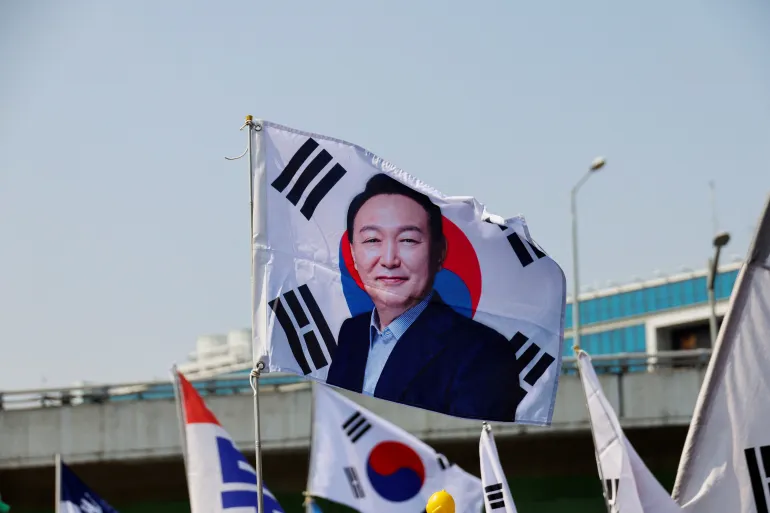Alexander Stubb, who has long backed NATO membership, speaks to Al Jazeera about the country’s decision to join the alliance amid the Ukraine war.
This year’s spring could herald a new security order for Finland and Sweden, as the two countries prepare to submit their NATO membership bids.
In January, Finland’s Prime Minister Sanna Marin reiterated her country’s traditional stance, that it had no plans of joining the security alliance. But in early April, she noted that “everything had changed” since Russia attacked Ukraine.
“Finland should be prepared for all kinds of actions from Russia,” she told reporters during a visit to Sweden, adding that Helsinki would decide on NATO membership “within weeks”.
While public support for Finland’s NATO membership used to hover between 20 and 30 percent, recent polls have shown that since the war in Ukraine began, about 70 percent of the Finnish public want their country to join NATO.
Al Jazeera spoke to Finland’s former Prime Minister Alexander Stubb to understand what led to this dramatic change.
Stubb, who has also served as Finland’s foreign and finance minister, is currently a professor and director at the School of Transnational Governance, based in the European University Institute in Florence.
Al Jazeera: How would you describe the national awakening in Finland towards joining NATO? What has changed?
Alexander Stubb: I think the decision on Finnish NATO membership was taken on February 24, at five o’clock in the morning, when [Russian President Vladimir] Putin attacked Ukraine. That’s when the public opinion basically took a 180 degree turn.
From 50 percent against and 20 percent in favour, to 50 percent in favour and 20 percent against. Currently, we are at 68 percent in favour and 12 percent against, and when our political leadership comes out with the application together with Sweden in mid-May, I predict that our figures will be over 80 percent in favour of NATO membership.
The basic line of thought is that if Putin can slaughter his brothers, sisters and cousins in Ukraine, he can do that in Finland and Sweden, as well.
For the Finns, this brings back memories of the Second World War. So NATO membership would be a way of increasing our own security and the security of the Alliance.
Al Jazeera: But this is not the first time Russia has attacked Ukraine. In 2014, when you were the Prime Minister of Finland, Russia annexed the Crimea region of Ukraine. Did you consider NATO membership back then?
Stubb: I’ve been one of the few people in Finland who has always advocated for Finnish NATO membership. In fact, I think we should have joined NATO in 1995, when we became a part of the European Union.
In 2008 I tried to push for NATO membership. I was Finland’s foreign minister back then and Chairman of the the Organization for Security and Co-operation in Europe (OSCE) and had mediated peace in the war in Georgia.
After these mediation talks, I gave a speech [on August 8, 2008], which was called 080808. In the speech, I explained how Russian aggression is back and that Finland should consider NATO membership. But I got a lot of pushback and since then, even when Russia attacked Ukraine in 2014, I didn’t try pushing for NATO membership because I was in the minority.
However, things are different now.
Looking at how Russia has attacked Ukraine in 2022, it seems like this invasion has provoked the people in Finland and changed their opinion. When public opinion changes, then political leaders change their opinions as well.
Al Jazeera: Prime Minister Sanna Marin spoke about Finland joining NATO when a security report warned that Finland’s potential membership could aggravate Russia further, causing tensions along the Finland-Russia border.
Do you think the prime minister should have waited for the current war in Ukraine to calm down?
Stubb: I think, you know, we’re past that debate currently. We don’t expect any conventional military threats, or attacks at all, because we have one of the largest standing armies in Europe – 900,000, reserves 280,000 to be mobilised, we just bought 64 F- 35s and we have the excellent defence missile systems.
I think we’re more NATO-ready than most of the alliance’s member states themselves.
But what we will see from the moment that we apply in mid-May, to the moment that we become NATO members, there will be hybrid threats. There will be cyberthreats, and there’ll be information war, and we’re prepared for that.
For instance when Ukraine’s President Volodymyr Zelenskyy was speaking in the Finnish Parliament about two and a half weeks ago, the homepages of Finland’s defence ministry and the foreign ministry went down. And, you know, obviously, it was a Russian attack.
At the same time, there was a violation of our airspace, obviously Russians again.
So these are the kind of threats we will continue getting and we’re ready. In the bigger picture, Finnish and Swedish NATO membership will also increase the security of the region.
Al Jazeera: Is there any opposition Finland could face from NATO members with respect to its ascension bid?
Alexander Stubb: I’m subjective, but it’s very difficult to make any rational argument against allowing Finland and Sweden to join NATO. Besides strong military troops, we both have the biggest Western telecommunication service companies in the world — Nokia and Ericsson and this is significant for the general infrastructure of security.
On top of that, we actually have the experience of fighting wars with Russia, considering our own history with the Kremlin. NATO members are aware of our capabilities and will not get a hothead when it comes to our membership.







